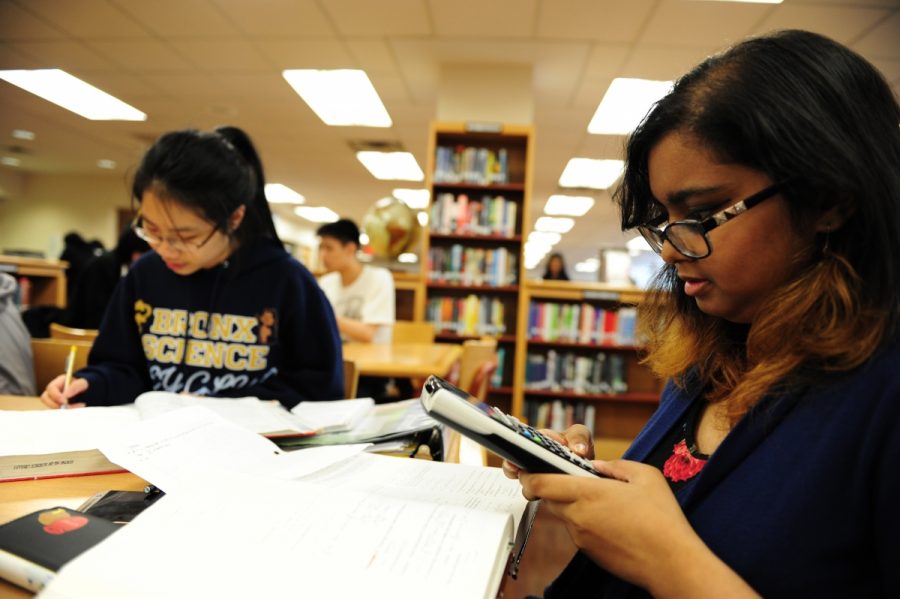Math Department Introduces New Grading Policy
Shamira Talukder ’17 and Keena Wong ’17 completing math homework in the library.
In past years, the words “Math test” have been enough to trigger a tremendous amount of stress and anxiety in many Bronx Science students. Exams alone had accounted for 70% of students’ math grades, making each and every one seem like an “end all, be all,” in the words of the new Assistant Principal of the Mathematics Department, Vikram Arora. This means that one test has the potential to lower not only students’ math grades but also their GPAs.
However, with the introduction of a new grading policy, students can breathe a little more easily, as tests will now account for 60% of students’ math grades, whereas homework and class participation have increased to 15% of the total math average.
Math teacher Randi Lerohl, called the new policy helpful, remarking, “It motivates teachers to encourage more participation, and it rewards students who work hard but aren’t the greatest test-takers.”
Additionally, Mr. Arora, who called the previous grading policy “test heavy,” said, “It’s very easy to get lost, give up, and move on in math, and students often give up after one bad math test.”
Similarly, Zach Delano-Nagle ’17 criticized the old policy for “putting so much emphasis on testing and [pushing students] to only care about doing well on tests.”
“Tests are the summit of an assessment. If students work hard, the tests will take care of themselves,” said Mr. Arora. He also emphasized the idea that, “Math is about learning concepts; it’s a marathon, not a sprint.”
As a result, the new grading policy seeks to reward perseverance and consistency, by increasing the emphasis on areas like homework and class participation.
Furthermore, the Math Department has released a new rubric for class participation, which will grade students’ class participation based on five major criterias: perseverance, behavior, thinking and sharing, class notes, and application of teacher’s feedback.
According to Ms. Lerohl, this new focus on participation will require students to put more effort into asking questions and leading discussions. She also hopes to help the relatively quiet students present their ideas in class.
Thus far, student response to the new policy has been highly positive. For instance, Unwana Abasiurua ’17 said, “It is a good policy that allows students to increase their grades. The old policy made it seems as though poor test takers didn’t try in class, even if they did their homework and participated in class 100% of the time.”
Abasiurua also expressed her wish that the new policy had taken effect even earlier, given students’ enthusiastic response to it.
Similarly, Zermeen Akhtar ’18 said, “The new policy means that a single test won’t make or break students’ grades, and students will have higher grades and less stress.”
Peter Alegre ’19 agreed. “The decreased emphasis on tests motivates students to do well in other aspects of class,” he said.
The changes don’t stop there, as expectations from Bronx Science students, other teachers, and parents are always high, but the Mathematics Department hopes to continue providing students with a quality education as well. And now, Bronx Science students have a more relaxed atmosphere in Mathematics classes in which to grow and learn.
Nistha Bade Shrestha is a Feature Editor for the Science Survey and a Student Life Staff Reporter for the Observatory yearbook. This is her third year...











